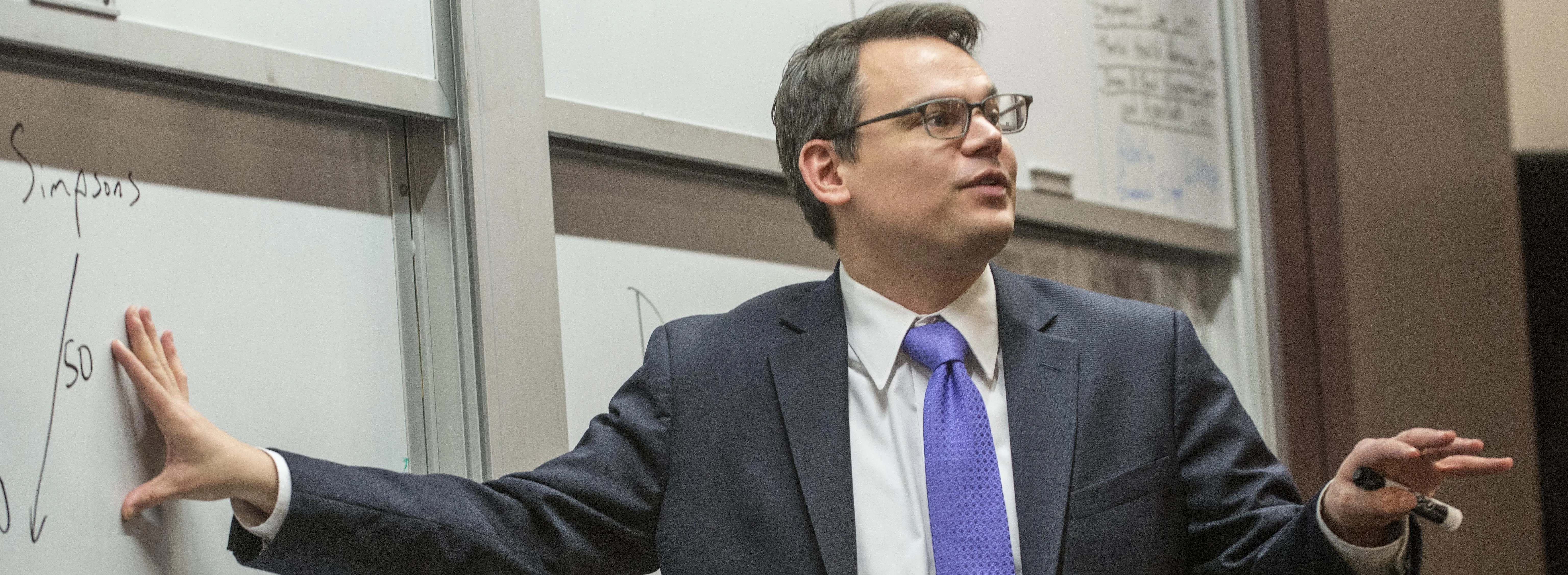How Much Individual Freedom Are We Willing to Sacrifice to Fight COVID-19?

Democrats and Republicans are equally open to many government measures that could slow the spread of the novel coronavirus but may also undermine civil liberties, according to a national survey coauthored by University of Chicago Law School Professor Adam Chilton. The poll, conducted in mid-March as state governments were ramping up efforts to confront the pandemic, revealed a “remarkable” level of tolerance for restrictions on liberty, said Chilton, a scholar whose work has included empirical research on constitutional rights.
Chilton and his collaborators—Kevin Cope, an associate professor of law and public policy at the University of Virginia; Charles Crabtree, an assistant professor of government at Dartmouth; and Mila Versteeg, a professor of law at the University of Virginia—asked a nationally representative sample of US residents about eight then-hypothetical policy proposals that governments could enact to help control to the spread of the virus. The proposals included travel restrictions, bans on the spread of misinformation, the quarantining of sick individuals in government facilities, the conscripting of healthcare workers, and the forced production and seizing of certain items, such as ventilators and personal protective equipment.
The findings reveal the extraordinary nature of the fight against COVID-19—and they raise important questions about what comes next: How far are we willing to go to stay safe? How do we prevent abuse once the immediate threat has receded?
In an interview on April 3 with Becky Beaupre Gillespie, the Law School’s director of content, Chilton addressed these questions, discussed what we can learn from history—and shared what we should think about going forward.
Gillespie: Before we dive in on your survey, I'd like to start by asking about some of the government action we’ve seen in recent weeks: stay-at-home or shelter-in-place orders, fines for congregating outdoors, business shutdowns, attempts to ban the sales of firearms, travel restrictions, and more. Are you concerned about any of the orders enacted so far?
Chilton: I think most of what we've seen in the US has been constitutionally permissible. Although the Constitution restricts the power of the federal government, states have a pretty expansive power to regulate us to promote health and safety. This is typically referred to as the police power, and it is what gives states the authority to zone neighborhoods, shut down businesses for violations of health codes, or fire marshals to restrict how many people can be in a bar and restaurant. To date, most of the steps that have been taken by cities and state—stay-at-home orders, rules against congregating, etc.—seem pretty clearly within that power.
Gillespie: Have you seen any constitutionally questionable proposals?
Chilton: A few. The Trump administration warned TV stations that they could lose their operating licenses if they aired ads containing misleading information about Trump's response to the coronavirus. If a license were rescinded, this may be a violation of the First Amendment, a threat to political speech. Another instance involved states that initially didn’t include gun stores on their list of essential businesses but included various other businesses, like liquor stores. Gun stores pushed back—they essentially said, “We’re protected by the Second Amendment, and yet liquor stores are allowed to stay open and there's nothing in the constitution protecting them”—and most states responded by walking back their orders. There was another example recently when Trump tweeted that he was considering locking down New York, New Jersey, and Connecticut. About five hours later he said he wasn’t going to do it. The idea that the federal government would not only restrict travel between states but try to lock people in place within a state—that that would be constitutionally questionable.
Gillespie: What type of precedent exists for these types of measures?
Chilton: Supreme Court precedent on quarantine orders dates from roughly the start of the 20th century, when there were two cases [Louisiana v. Texas (1900) and Compagnie Francaise de Navigation a Vapeur v. Louisiana Board of Health (1902)] that acknowledged the states’ rights to prevent travel within their borders for legitimate quarantine reasons. In the 1902 case, the city of New Orleans had an outbreak of yellow fever, and they imposed a quarantine, not letting new people into the city. When a ship arrived in New Orleans from Europe, passengers were not allowed to disembark—which is similar to what we're now seeing in Rhode Island, Texas, Alaska, Hawaii and other places where governors are trying to restrict citizens traveling to their states from coronavirus hotspots.
Gillespie: Let's talk about the survey. A few weeks ago, as government restrictions were ramping up, you and your collaborators polled a nationally representative sample of 3,000 US residents and asked what they thought about eight policy proposals that conceivably could be enacted to slow the virus's spread. In broad strokes, what did you find?
Chilton: Each proposal had majority support. In many cases, it was quite a large majority supporting measures that would restrict movement or speech or private activity in various ways.
Gillespie: Were you surprised?
Chilton: I assumed that respondents would be supportive of some proposals, especially restrictions on travel. But I was definitely surprised to see such big majorities—and I was surprised to see support for proposals that restricted speech.
Gillespie: Did Democrats and Republicans differ in their responses?
Chilton: This is perhaps the most shocking finding. Although our survey had a large partisan gap in terms of President Trump’s handling of the crisis—34 percent of Democrats were supportive of the handling compared with 88 percent of Republicans—when we asked about the specific policies, a majority of both Democrats and Republicans supported every policy. In many of the cases, the gap between the groups was very small.
Gillespie: What were the eight proposals? [Note: Although most of the proposals were hypothetical when the survey was conducted in mid-March, several have since been enacted in whole or in part.]
Chilton: We asked how people felt about the government: taking over relevant businesses and seizing property, for instance to build respirators or masks; limiting all non-essential movement for people outside their homes; banning large gatherings; prohibiting all people, including American citizens, from reentering the country; prohibiting people from spreading misinformation about the virus; suspending all religious services or gatherings; compelling healthcare professionals to work; and detaining any individuals that exhibit any symptoms and quarantining of them in government facilities.
Gillespie: Which of these policies had the highest levels of support and which had the lowest?
Chilton: Banning non-citizens from entering the country had the highest level of support from both Democrats and Republicans, at roughly 85 percent overall. Taking over private businesses and seizing property had the lowest level of support among both Democrats and Republicans, at roughly 55 percent overall. Most of the policies had support around 75 percent, including detentions in government facilities, conscripting people to work, suspending religious services, and movement outside of homes.
Gillespie: Is there a danger of constitutional backsliding if people acclimate to restrictions?
Chilton: It is certainly a concern that people would come to tolerate these policies, which may seem reasonable right now, even after the worst part of the crisis passes. Additionally, it's always possible that opportunistic politicians or political parties could try to pass laws like we've seen in Estonia or Hungary where the real goal is to accomplish some other political objective: silencing critics, punishing certain industries, rolling back unpopular regulations.
Gillespie: What are the red flags?
Chilton: Responses in which the primary objective seems to be about accomplishing other political goals rather than halting the spread of infection. The Trump administration’s attempt to eliminate political speech [with the notice to TV stations] seemed like a red flag to me. This is a concern any time there’s a disaster and you end up with a large public majority willing to let the government to take radical actions to make us safe again. Many of the actions may be totally reasonable, but there have also been times when the government has overreached, and we’ve looked back and seen those actions as constitutionally and morally problematic. In World War II, we had Japanese internment. After September 11th, you might point to the invasion of Iraq, aspects of the Patriot Act, or other monitoring of Muslim Americans. It's tough to know now what could end up being problematic here, but the potential is there.
Gillespie: What’s next with this research?
Chilton: We’re looking at other countries. We've already run the same basic survey in Japan and Israel. We’re also hoping to run surveys in Taiwan, China, South Korea, and possibly other countries. We're trying to see to what extent the United States’ response is unique. My instinct is that it is not. I expect that there will be some differences across countries for a variety of reasons, but that we’ll generally find that, during a crisis, people are willing to let their government take dramatic actions if they believe it will help keep them safe.
